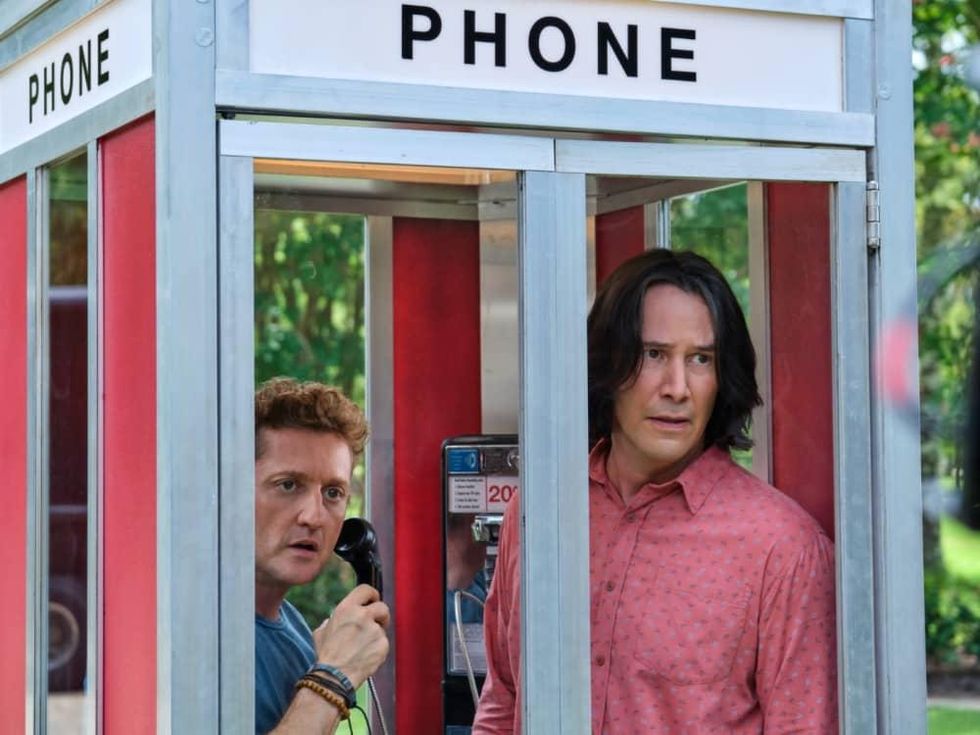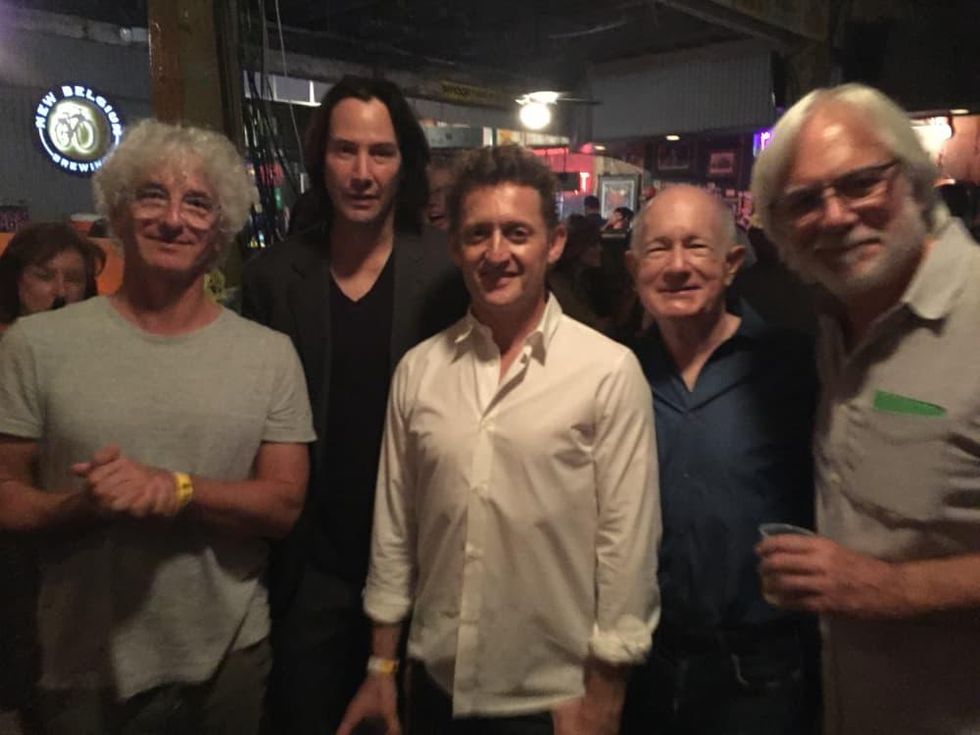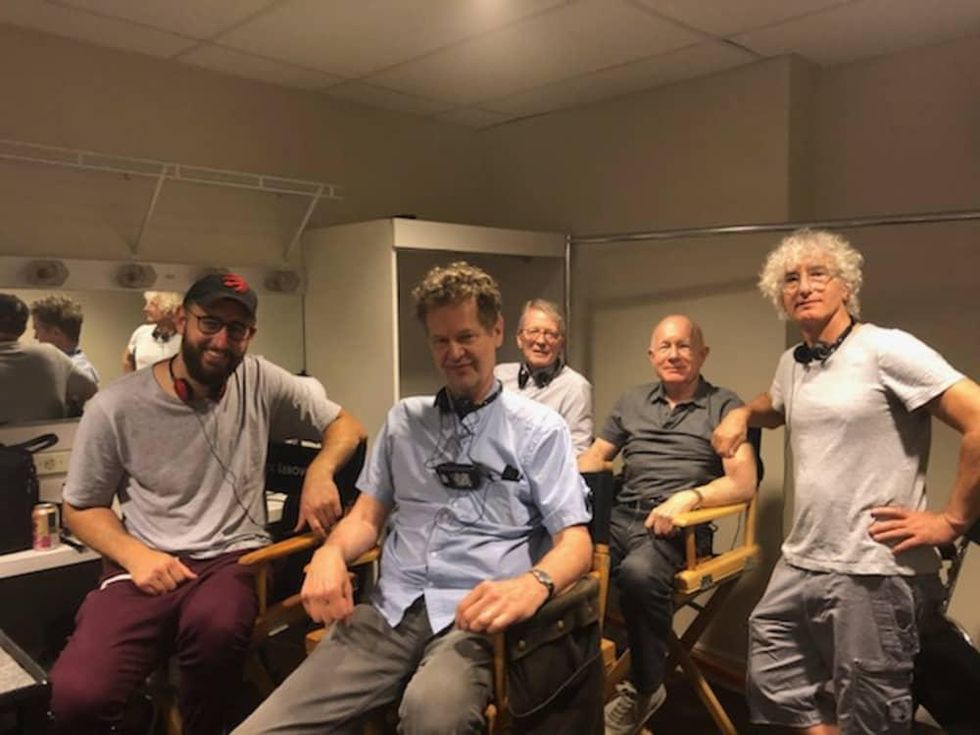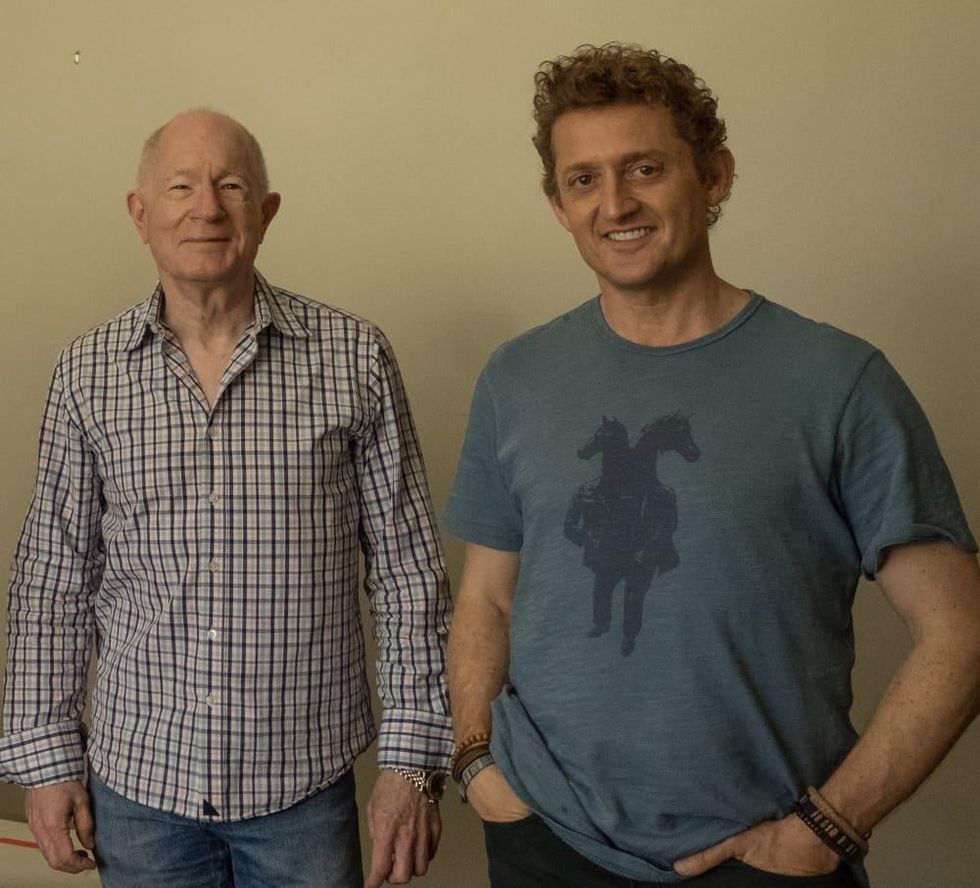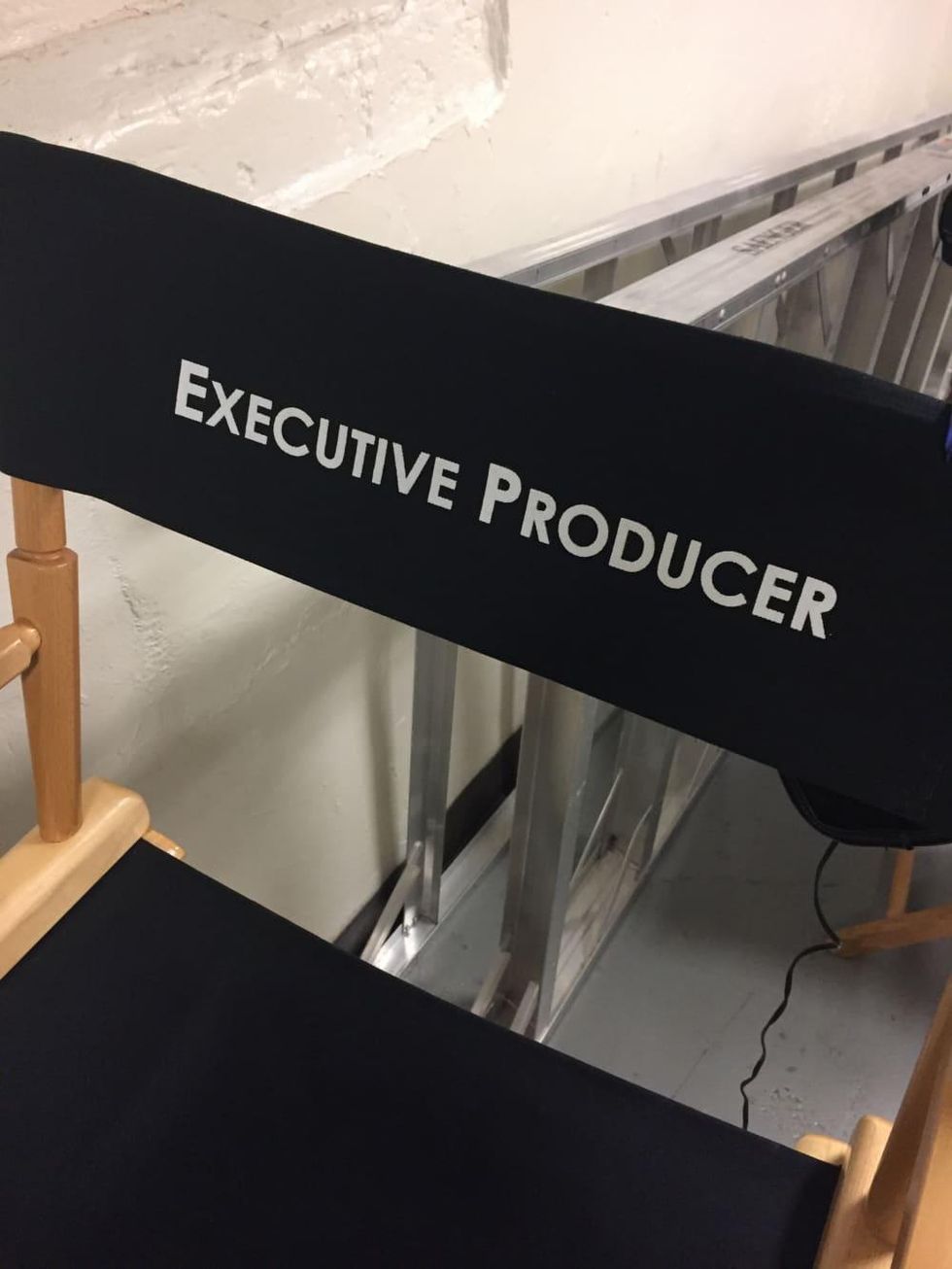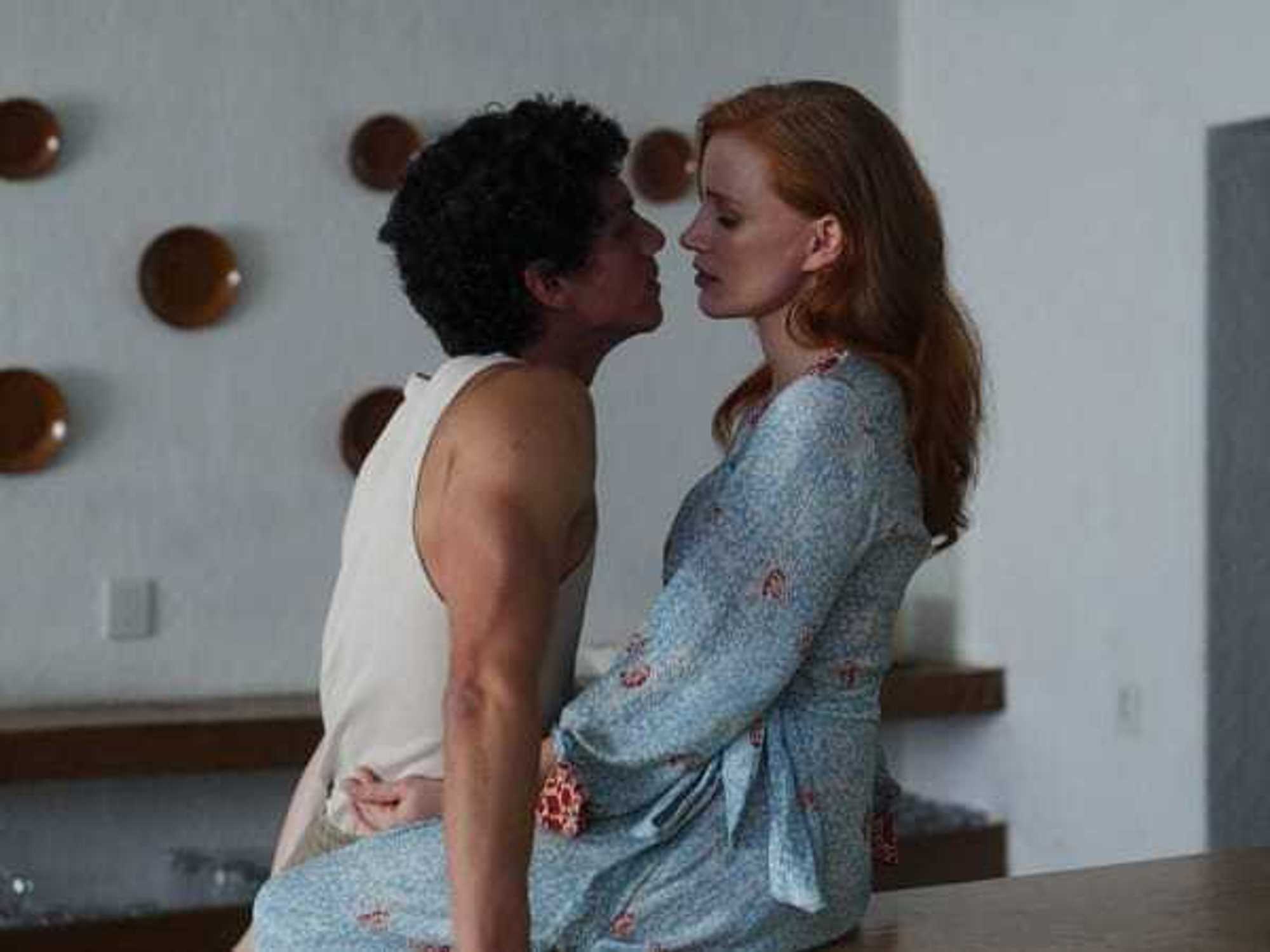Movie news
This excellent Texan is behind the blockbuster return of Bill and Ted
A devastating, global pandemic. Racial strife and division. A meteor that’s reportedly headed dangerously close to earth this fall. Indeed, 2020 is one of the most brutal years in recorded American history.
Man, do we need Bill and Ted.
To the delight — and relief — of fans around the globe, two of cinema’s most cherished and beloved goofballs are returning to screens for Bill and Ted Face the Music, the third movie (after the breakout Excellent Adventure and sequel Bogus Journey) in the iconic Bill and Ted franchise that launched in 1989 and rocketed Keanu Reeves and Alex Winter into stardom — as well as young screenwriters Ed Solomon and Chris Matheson, who created the characters from an improv skit.
The film, dubbed a “threequel,” is set for national release on Friday, August 28 in select theaters and on-demand.
If social media reaction is any indicator, Face the Music is easily the most anticipated comedy of the year. The movie revisits Bill S. Preston Esquire and Ted “Theodore” Logan, the young dudes from San Dimas, California who forever injected air guitar riffs and the phrases “party on,” “excellent,” and “bogus’ into pop culture lexicon — and made time travel in a phone booth seem almost commonplace.
This time around finds Bill and Ted both married, with teenage daughters Wilhelmina “Billie” Logan and Theodora “Thea” Preston. Bill and Ted are in the midst of a midlife crisis with their band, Wyld Stallyns, when suddenly, the middle-aged bros are visited by a mysterious figure who tells them they must write a song in 78 minutes — in order to save the universe. (Which is just so 2020, no?) The boys are back, and ready to hopefully save the day.
And in a twist of local fate, a Texan, Grant Guthrie, is behind this totally epic comeback — one that almost didn’t happen.
A generous Grant
“Any fan of Bill and Ted should be on their knees thanking Grant and the investor that he brought into the project,” says the acclaimed screenwriter, Solomon, whose credits include the Bill and Ted franchise and Men in Black. “But not for them, this movie would not be here. Period.”
Diehard fans of the franchise might be surprised to learn that Solomon and Matheson tried to get the Bill and Ted threequel produced 12 years ago — to no avail. “We were really disillusioned that it didn’t happen,” Solomon recalls. The writing duo presented a script to MGM: “We thought it was a slam dunk but they had a different plan in mind,” says Solomon. “They wanted to make the movie as a reboot. Thankfully that fell apart.”
But quite a few things changed culturally, notes Solomon: “Keanu’s star rose. Social media and the rise and the voices of the people let people know that there is a market for this movie — as it is.”
Cut to Houston, where movie executive producer Grant Guthrie, who boasts 11 films produced, including Stuck in Love, was looking for his next project. (Full disclosure: Guthrie is a shareholder of Gow Media, which owns CultureMap.) Guthrie was pursuing several options, including a film starring Matthew McConaughey. But the stars aligned when he met Los Angeles' Alex Lebovici, a 32-year-old producer pushing to get a new Bill and Ted movie made.
Lebovici came to Texas, crashed at Houston's Post Oak Hotel, and pitched Face the Music to Guthrie and his investing partner (who is also a Gow Media board member and wishes not to be named in this story for privacy purposes). It wasn’t a hard sell. “I was a huge Bill and Ted fan to begin with,” says Guthrie, who was also lured by the star power that Reeves — who boasts a massive $4.5 billion in box office sales and was just coming off his most recent John Wick film (Parabellum) — was bringing to the project.
“This is a movie by the original team and supportive fans — for the fans,” says Lebovici. “I was born in ’86 — I saw it when I was eight years old and became obsessed with it. So, when I had a chance to bring the franchise back, I had to jump in.” Lebovici’s passion for the project wasn’t exactly shared by the studio. “They didn’t have much interest in funding it, so my deal was to put together something completely independent,” he says.
The threequel was originally pitched as a $16 million film, but the production team soon realized it would require a budget of closer to more than $30 million. “There aren’t many films that are this budget size that are completely independently financed,” notes Lebovici, whose executive producing credits include Roman J. Israel, Esq. and The Red Sea Diving Resort.
Soon, MGM/Orion committed to a 3,000-screen release for the film. “One thing I’ve learned is that you need to have a strong theatrical distribution plan in place or have a studio behind it, because the market is so fragmented,” says Guthrie. “There are so many choices out there with Netflix and everything else.”
Also a boon: Reeves and Winter nearly broke the internet when they made an impromptu message announcing their big return on social media. “The first week we had 6 million views on Instagram,” says Guthrie. “Before it was over, the engagements were around 60 million views — and that was before we started production. Obviously, Orion was pretty excited about that,” Guthrie laughs.
And why not? “You think about how many people it takes to have a really successful film, that’s probably nine million theater tickets sold,” says Guthrie. “So, 60 million views makes for pretty good odds.”
A rockin’ adventure
Two weeks before principal shooting started, “we lost a gigantic portion of the funding of the film,” remembers Solomon, as a major consortium dropped out. “Grant’s investor and another investor, David Haring, stepped up and took a gigantic risk. I am forever grateful to these guys.” Lebovici, meanwhile, credits Guthrie and his partner for being “completely supportive” in ensuring the sequel had the “budget it deserved.”
The production team picked New Orleans for its generous tax credits to shoot the threequel last summer. (True to Gulf Coast form, Hurricane Barry shut down shooting for two days.) Guthrie and his partner were fixtures on the set and quickly won over and charmed the seasoned Hollywood veterans. “There’s a gentlemanly way that they conducted themselves,” says Lebovici. “That’s very refreshing in this business — not everybody does. They were very kind and generous — very Texas. I deal with nightmare investors all the time. They were some of the most pleasant I've ever dealt with.”
Solomon, revered in the industry for his hefty screenwriting resume, has effusive praise for the duo: “Oftentimes, a financier shows up and their presence is something that has to be kowtowed to, or their egos need excessive attention, and it takes away from the production. Those guys were the opposite. They were there to let us work and they wanted to stay as far in the distance as possible.”
The screenwriter agrees that Guthrie and his partner’s Texas roots made them even more agreeable. “I think it was a great blessing for us that they weren’t typical Hollywood guys,” Solomon continues. “They didn’t realize what assholes they could’ve been — and chose not to be. We got lucky.”
Guthrie reflects on the cast dinners, musical outings in New Orleans, and the work on-set. “We’d start at 5 pm and go into early the next morning, so it was good to have a little fun.” He affirms Reeves’ approachable reputation. “Everything you read about Keanu is true,” says Guthrie. “He’s genuinely a wonderful human being — a little shy and humble. He doesn't throw his weight around as far as being a star.”
Guthrie also teases that actress Brigette Lundy-Paine (Billie Logan), whom he especially connected with during filming, is one to watch. “She’s a breakout star. She’s pumped-up, enthusiastic, and just fun to watch. She just reminds me of Keanu in so many ways. She even looks like him at that age. She’s bubbly, enthusiastic, and a little goofy. She just rocks it.”
Despite the hiccups, Guthrie says Face the Music was an “amazing” experience. “This is my 11th film and the most fun I’ve ever had. Filmmaking can be tiring and tedious, but we had so much fun. You spend three months together and become an extended family.”
Bill and Ted face the pandemic
But, a not-so-funny thing happened on the way to the release: COVID-19. The original contractual commitment from MGM/Orion/United Artists was for 3,000 screens nationwide, along with major foreign distribution. “That would’ve translated to $80 to $100 million in box office,” says Guthrie. “Now, who knows? It’s a whole new world.”
Not even the studio, says Guthrie, was prepped for the pandemic, especially for a film such as Face the Music, which is ideally enjoyed in a communal setting. “This is a film meant to be shared in a theatrical setting, so the group can react and laugh together,” says Guthrie, noting that while on-demand isn’t the ideal distribution, Face the Music could be a goldmine.
“The social media feedback that is there now is overwhelming,” Guthrie says. “I think, in the long run, it does the same kind of numbers. I think everyone is optimistic that it’s going to be a financial success.”
In order to ensure success, Solomon notes that to make the movie work, “all the creatives worked for a tiny fraction of our salaries. And even of that, we put most of that back into the movie just so we could keep it afloat. But I hope Grant and his partner and the investors get super rich.”
And why not? Face the Music is a “silly fun, uncynical, wholesome diversion — an absurd, ridiculous comedy about failure and disillusionment and disappointment, but ultimately hope,” says Solomon. “There’s no swearing, sex, or violence — it’s definitely a movie to watch with your family if you want to.”
Guthrie adds that Face the Music is an “antidote to the weariness we’re all experiencing,” one that we need today more than ever.
“We’re not just struggling as a country, we’re struggling as a world,” says Solomon. “I hope this movie is a diversion for people. I hope families sit down together and have a nice, 90-minute smile. That would be my dream for this.”
A most excellent dream, indeed, dude.
